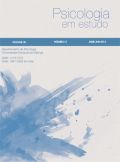AUTISMO: HISTÓRIA DE UM QUADRO E O QUADRO DE UMA HISTÓRIA
Resumo
Com o crescente interesse público pela questão do autismo, assistimos a uma torção importante do debate que caracteriza esse tema. Inicialmente reduzida ao campo científico – em geral médico – a questão do autismo se viu progressivamente encampada por diferentes agentes, sobretudo pelos próprios autistas, cujas contribuições ampliaram muito o que podemos saber hoje sobre o autismo. Com o termo narrativas do autismo, tivemos como proposta neste artigo demonstrar a riqueza dos aportes desses novos saberes para o debate científico e político sobre a questão, bem como demonstrar o risco dela permanecer encapsulada e restrita ao campo estritamente científico. Para tanto, passamos pela história do conceito ressaltando como nela se pode ver o quanto o percurso científico vai sendo afetado, enriquecido por influência desses outros agentes e o valor de se tomar em consideração as diversas narrativas sobre o autismo. Situar a diversidade dessas narrativas não tem como objetivo apenas retomar uma posição plural e aberta contra outra exclusiva e restritiva, mas, antes, de colocar em curso o que pode acontecer ao debate científico quando ele não se fecha demasiadamente sobre a tendência objetivante própria a organização do discurso científico.
Situar a diversidade dessas narrativas não tem como objetivo apenas retomar uma posição plural e aberta contra outra exclusiva e restritiva, mas, antes, de colocar em curso o que pode acontecer ao debate científico quando ele não se fecha demasiadamente sobre a tendência objetivante própria a organização do discurso científico.
Downloads
Referências
REFERÊNCIAS
Donvan, J. & Zucker, C. (2017). Outra sintonia: a história do autismo (Trad. L. A. De
Araújo). São Paulo: Companhia das Letras
Eyal, G., Hart, B., Onculer, E., Oren, N & Rossi, N. (2010). The autism matrix: the
social origins of the autism epidemic. Cambridge: Polity Press.
Grandin, T. & Scariano, M. M. (2014). Uma menina estranha: autobiografia de uma
autista. São Paulo: Editora Schwarcz.
Hassal, R. (2016). Does everybody with an Autism diagnosis have the same underlying
condition?. In K. Runswick-Cole, R. Mallet & S. Timimi. (Orgs.), Re-thinking autism: diagnosis, identity and equality. (pp. 49-66). London and Philadelphia: Jessica Kingsley Publishers.
Kanner, L. (2012). Os distúrbios autísticos do contato afetivo (pp. 111-170). In P. S.
Rocha (Org.). Autismos. São Paulo: Escuta (Texto original publicado em 1943).
Lacan, J. (1998). A ciência e a verdade. In: J. Lacan. Escritos. (p. 869-892). Rio de
Janeiro: JZE.
Lyotard, J-F. (1989). A condição pós-moderna. Lisboa: Gradiva
Maleval, J-C. (2017). O autista e a sua voz (Trad. P. S. De Souza Jr). São Paulo:
Blucher.
Mottron, L. (2004). L’autisme: une autre intelligence: Diagnostic, cognition et support
des personnes autistes sans déficience intelectuelle. Bruxelles: Mardaga.
Ortega, F; Zorzanelli, R. & Rios, C. (2016). The Biopolitics of Autism in Brazil. In K.
Runswick-Cole, R. Mallet & S. Timimi. (Orgs.) Re-thinking autism: diagnosis, identity and equality. (pp. 67-89). London and Philadelphia: Jessica Kingsley Publishers.
Popper, K. (1995). A lógica da pesquisa científica. São Paulo: Cultrix.
Runswick, K., Mallet, R. & Timimi, S. (2016). Introduction. In K. Runswick-Cole, R.
Malllet & S. Timimi. (Orgs.), Re-thinking autism: diagnosis, identity and equality (pp. 7-15). London and Philadelphia: Jessica Kingsley Publishers.
Runswick, K. (2016). Understanding this Thing called Autism. In K. Runswick-Cole; R.
Mallet & S. Timimi. (Orgs.), Re-thinking autism: diagnosis, identity and equality (pp. 19-29). London and Philadelphia: Jessica Kingsley Publishers.
Silberman, S. (2016). Neurotribes: the legacy of autism and the future of neurodiversity.
New York: Avery.
Thomas, M-C. (2011). L’autisme et les langues. Paris: L’Harmattan.
Copyright (c) 2021 Psicologia em Estudo

This work is licensed under a Creative Commons Attribution-NonCommercial 4.0 International License.
As opiniões emitidas, são de exclusiva responsabilidade do(s) autor(es). Ao submeterem o manuscrito ao Conselho Editorial de Psicologia em Estudo, o(s) autor(es) assume(m) a responsabilidade de não ter previamente publicado ou submetido o mesmo manuscrito por outro periódico. Em caso de autoria múltipla, o manuscrito deve vir acompanhado de autorização assinada por todos os autores. Artigos aceitos para publicação passam a ser propriedade da revista, podendo ser remixados e reaproveitados conforme prevê a licença Creative Commons CC-BY.
The opinions expressed are the sole responsibility of the author (s). When submitting the manuscript to the Editorial Board of Study Psychology, the author (s) assumes responsibility for not having previously published or submitted the same manuscript by another journal. In case of multiple authorship, the manuscript must be accompanied by an authorization signed by all authors. Articles accepted for publication become the property of the journal, and can be remixed and reused as provided for in theby a license Creative Commons CC-BY.
















